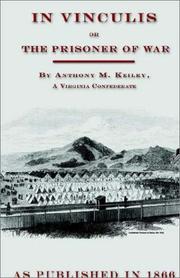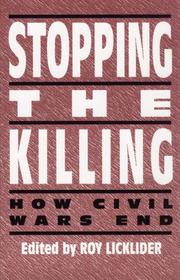| Listing 1 - 10 of 81 | << page >> |
Sort by
|
Book
ISBN: 3030819930 3030819922 Year: 2021 Publisher: Cham, Switzerland : Palgrave Pivot,
Abstract | Keywords | Export | Availability | Bookmark
 Loading...
Loading...Choose an application
- Reference Manager
- EndNote
- RefWorks (Direct export to RefWorks)
Civil war --- Forecasting. --- Data processing. --- Prevention. --- Civil wars --- Intra-state war --- Rebellions --- Government, Resistance to --- International law --- Revolutions --- War

ISBN: 1582183228 9781582183220 1582183244 Year: 1866 Publisher: Petersburg, Va. "Daily index" Office
Abstract | Keywords | Export | Availability | Bookmark
 Loading...
Loading...Choose an application
- Reference Manager
- EndNote
- RefWorks (Direct export to RefWorks)
Civil war --- Civil wars --- Intra-state war --- Rebellions --- Government, Resistance to --- International law --- Revolutions --- War --- United States --- History --- Prisoners and prisons. --- Prisoners, Exchange of
Book
ISBN: 1626370826 9781626370821 9781588268273 1588268276 Year: 2022 Publisher: Boulder
Abstract | Keywords | Export | Availability | Bookmark
 Loading...
Loading...Choose an application
- Reference Manager
- EndNote
- RefWorks (Direct export to RefWorks)
Wars of secession, ethnic wars, rebellions, and mutinies have been part of the political landscape of the Democratic Republic of Congo since the country became independent in 1960. Why? And what can we learn from this seemingly unending series of internal conflicts? Emizet François Kisangani explores these fundamental questions within a rigorously systematic and uniquely comprehensive framework. Looking closely at five decades of civil wars in the DRC, Kisangani finds ample evidence to challenge popular paradigms. His focus on the politics of exclusion and his attention to both the micro- and macroprocesses of the wars provides an analytical lens through which not only the nature of civil wars, but also Congo’s politics more broadly, are brought into clearer focus.
Civil war --- Civil wars --- Intra-state war --- Rebellions --- Government, Resistance to --- International law --- Revolutions --- War --- History. --- Social aspects --- Congo (Democratic Republic) --- Politics and government
Book
ISBN: 1527500470 9781527500471 1527500470 Year: 2017 Publisher: Newcastle upon Tyne, UK : Cambridge Scholars Publishing,
Abstract | Keywords | Export | Availability | Bookmark
 Loading...
Loading...Choose an application
- Reference Manager
- EndNote
- RefWorks (Direct export to RefWorks)
This book identifies the conditions under which foreign countries intervene in civil wars, contending that we should consider four dimensions of civil war intervention. The first dimension is the civil war itself. The characteristics of the civil war itself are important determinants of a third party's decision making regarding intervention. The second dimension is the characteristics of intervening states, and includes their capabilities and domestic political environments. The third is the relationship between the host country and the intervening country. These states' formal alliances and the differences in military capability between the target country and the potential intervener have an impact on the decision making process. The fourth dimension is the relationship between the interveners. This framework of four dimensions proves critical in understanding foreign intervention in civil wars. Based on this framework, the model for the intervention mechanism can reflect reality better. By including the relationships between the interveners here, the book shows that it is important to distinguish between intervention on the side of the government and intervention on behalf of the opposition. Without distinguishing between these, it is impossible to consider the concepts of counter-intervention and bandwagoning intervention.
Civil war. --- Intervention (International law) --- Civil wars --- Intra-state war --- Rebellions --- Government, Resistance to --- International law --- Revolutions --- War --- Military intervention --- Diplomacy --- Neutrality

ISBN: 1603447334 0585388474 9780585388472 9780890968567 089096856X Year: 1999 Publisher: College Station : Texas A&M University Press,
Abstract | Keywords | Export | Availability | Bookmark
 Loading...
Loading...Choose an application
- Reference Manager
- EndNote
- RefWorks (Direct export to RefWorks)
HISTORY --- Europe / Eastern --- Russia & Former Soviet Republics --- Regions & Countries - Europe --- History & Archaeology --- Civil war --- Chechni͡a (Russia) --- History --- Civil wars --- Intra-state war --- Rebellions --- Government, Resistance to --- International law --- Revolutions --- War --- Chechni︠a︡ (Russia) --- Chechnia (Russia)
Book
ISBN: 9789004373594 9789004409521 9004409521 9004373594 Year: 2019 Volume: 5 Publisher: Leiden : Brill,
Abstract | Keywords | Export | Availability | Bookmark
 Loading...
Loading...Choose an application
- Reference Manager
- EndNote
- RefWorks (Direct export to RefWorks)
"The Historiography of Late Republican Civil War is part of a burgeoning new trend that focuses on the great impact of stasis and civil war on Roman society. This volume specifically concentrates on the Late Republic, a transformative period marked by social and political violence, stasis, factional strife, and civil war. Its constitutive chapters closely study developments and discussions concerning the concept of civil war in the late republican and early imperial historiography of the late Republic, from L. Cornelius Sulla Felix to the Severan dynasty. Contributors are: Carsten H. Lange; Frederik J. Vervaet; Andrew J. Turner; Richard Westall; John A. Lobur; Henriette van der Blom; Josiah Osgood; Pedro López Barja de Quiroga; Dexter Hoyos; Eleanor Cowan; Michèle Lowrie; Barbara Vinken; Honora H. Chapman; Federico Santangelo; Rhiannon Ash; David Wardle; Bram L.H. ten Berge; Kathryn Welch; Jesper M. Madsen"--
Civil War --- Historiography. --- Rome --- History --- Civil war --- Historiography --- Civil wars --- Intra-state war --- Rebellions --- Government, Resistance to --- International law --- Revolutions --- War --- Rim --- Roman Empire --- Roman Republic (510-30 B.C.) --- Romi (Empire) --- Byzantine Empire --- Rome (Italy) --- E-books
Book
ISBN: 1316731243 1316744752 1316746682 1316711323 1316748618 1316754405 9781107166714 1107166713 9781316617717 1316617718 9781316711323 1316733173 9781316752470 131675247X 9781316754405 Year: 2016 Publisher: Cambridge Cambridge University Press
Abstract | Keywords | Export | Availability | Bookmark
 Loading...
Loading...Choose an application
- Reference Manager
- EndNote
- RefWorks (Direct export to RefWorks)
Why do some countries emerge from civil war more democratic than when they entered into it, while others remain staunchly autocratic? Observers widely depict internal conflict as a pathway to autocracy or state failure, but in fact there is variation in post-civil war regimes. Conventional accounts focus on war outcomes and international peacebuilding, but Huang suggests that postwar regimes have wartime origins, notably in how rebel groups interact with ordinary people as part of war-making. War can have mobilizing effects when rebels engage extensively with civilian populations, catalyzing a bottom-up force for change toward greater political rights. Politics after civil war does not emerge from a blank slate, but reflects the war's institutional and social legacies. The Wartime Origins of Democratization explores these ideas through an original dataset of rebel governance and rigorous comparative case analysis. The findings have far-reaching implications for understanding wartime political orders, statebuilding, and international peacebuilding.
Politics and war. --- Civil war --- Democratization. --- Political aspects. --- Democratization --- Politics and war --- War --- War and politics --- Civil wars --- Intra-state war --- Rebellions --- Government, Resistance to --- International law --- Revolutions --- Democratic consolidation --- Democratic transition --- Political science --- New democracies --- Political aspects
Book
ISBN: 9781107683488 9781139149426 9781107023024 9781139845038 1139845039 9781139840293 1139840290 1139149423 1283836068 9781283836067 9781139842679 1139842676 1107023025 1107683483 1139854119 1107235960 110725454X 1139841483 Year: 2012 Publisher: Cambridge Cambridge University Press
Abstract | Keywords | Export | Availability | Bookmark
 Loading...
Loading...Choose an application
- Reference Manager
- EndNote
- RefWorks (Direct export to RefWorks)
Some of the most brutal and long-lasting civil wars of our time involve the rapid formation and disintegration of alliances among warring groups, as well as fractionalization within them. It would be natural to suppose that warring groups form alliances based on shared identity considerations - such as Christian groups allying with Christian groups - but this is not what we see. Two groups that identify themselves as bitter foes one day, on the basis of some identity narrative, might be allies the next day and vice versa. Nor is any group, however homogeneous, safe from internal fractionalization. Rather, looking closely at the civil wars in Afghanistan and Bosnia and testing against the broader universe of fifty-three cases of multiparty civil wars, Fotini Christia finds that the relative power distribution between and within various warring groups is the primary driving force behind alliance formation, alliance changes, group splits and internal group takeovers.
Civil war. --- Alliances. --- Civil war --- Alliances --- Treaties of alliance --- International relations --- Treaties --- Civil wars --- Intra-state war --- Rebellions --- Government, Resistance to --- International law --- Revolutions --- War --- Law and legislation --- Social Sciences --- Political Science

ISBN: 0814765424 9780814765425 0814750702 9780814750971 0814750974 9780814750704 Year: 1993 Publisher: New York, N.Y. New York University press
Abstract | Keywords | Export | Availability | Bookmark
 Loading...
Loading...Choose an application
- Reference Manager
- EndNote
- RefWorks (Direct export to RefWorks)
Yugoslavia, Rwanda, Liberia, Somalia, Azerbaijan, El Salvador, Northern Ireland, Lebanon, Cambodia -- all provide bloody evidence that civil wars continue to have a powerful impact on the international scene. Because they tear at the very fabric of a society and pit countryman against countryman, civil wars are often the most brutal and difficult to extinguish -- witness the American Revolution. And yet, civil wars do inevitably end. England is no longer criss-crossed by warring armies representing York and Lancaster or King and Parliament. The French no longer kill one another over the divine right of kings. Argentines seem reconciled to living in a single state, rather than several. The ideologies of the Spanish Civil War now seem largely irrelevant. And the possibility of Southern secession is an issue long-buried in the American past. The question then begs itself: how do people who have been killing one another with considerable enthusiasm and success come together to form a common government? How can individuals and factions work together, politically and economically, with others who have killed their friends, parents, children and lovers? How are armed societies disarmed? What effect does a total military victory have on a lasting peace? In sum, how are civil societies constructed from civil violence and chaos? This is the central concern of Stopping the Killing.In this highly original and much needed volume, a distinguished group of experts on civil wars discuss both specific conflicts and broader theoretical issues. Individual chapters examine civil wars in Colombia, the Sudan, Yemen, America, Greece, and Nigeria, and analyze the causes of peace, the relationship between the battlefield and the negotiating table, and issues of settlement. An introduction and conclusion by the editor unify the volume. Contributors include: Jonathan Hartlyn (Univ. of North Carolina), Caroline Hartzell (Univ. of California, Davis), Jane E. Holl (U.S. Military Academy), John Iatrides (Southern Connecticut State University), James O'Connell (University of Bradford), Donald Rothchild (Univ. of California, Davis), Stephen John Stedman (Johns Hopkins Univ.), Robert Harrison Wagner (Univ. of Texas, Austin), Harvey Waterman (Rutgers Univ.), Manfred Wenner (Northern Illinois Univ.), and I. William Zartman (Johns Hopkins Univ.).
War (International law) --- Civil war. --- Hostilities --- International law --- Neutrality --- Civil wars --- Intra-state war --- Rebellions --- Government, Resistance to --- Revolutions --- War --- Civil war --- #SBIB:327.5H21 --- Vrede – oorlog, oorlogssituaties --- Polemology
Book
ISBN: 1849646244 9781849646246 0745332218 9780745332215 074533220X 9780745332208 9780745332215 9780745332208 Year: 2012 Publisher: London Pluto
Abstract | Keywords | Export | Availability | Bookmark
 Loading...
Loading...Choose an application
- Reference Manager
- EndNote
- RefWorks (Direct export to RefWorks)
Civil war --- History & Archaeology --- Regions & Countries - Africa --- Civil wars --- Intra-state war --- Rebellions --- Government, Resistance to --- International law --- Revolutions --- War --- Political systems --- International relations. Foreign policy --- Polemology --- Sierra Leone
| Listing 1 - 10 of 81 | << page >> |
Sort by
|

 Search
Search Feedback
Feedback About UniCat
About UniCat  Help
Help News
News